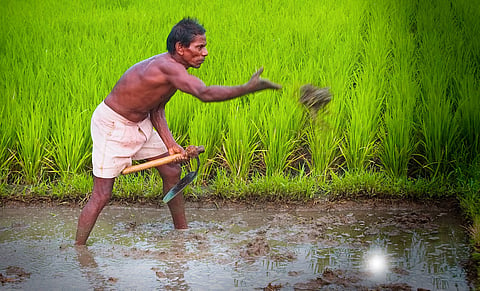The first agriculture Rs34,000-crore budget presented by the DMK government in Tamil Nadu highlights how much it costs to subsidise agriculture, among other things. The budget includes a subsidy of Rs4,508.32 crore for providing free electricity, Rs114.68 crore for a solar powered pumpset scheme and Rs15,000 per hectare to farmers involved in vegetable cultivation, apart from a slew of sops to exporters.
But that would be a linear way of looking at things. Along with the subsidies, there are proposals for setting up moringa (drumsticks) special export zone comprising seven districts, a special centre for jackfruit production, an integrated village agriculture market in Nilgiris, an organic farming research centre, and steps to get geographical indication (GI) tag for local produce. The DMK-led state government maintains that the budget has been designed to transform TN’s agriculture sector into value-oriented one and farmers into traders/businessmen to improve their income.
The larger idea is to develop agriculture as a stable impetus to economic growth. Agriculture was the only sector to have clocked a positive growth of 3.4 per cent countrywide at constant prices in 2020-21, when other sectors slid. The share of agriculture in gross domestic product (GDP) reached almost 20 per cent for the first time in the last 17 years, making it the sole bright spot in GDP performance during 2020-21.
However, the underlying political thrust of TN’s move cannot be missed and may be replicated by other states by other states. As it is, TN has become the third state – after Karnataka and Andhra Pradesh – to have a separate agricultural budget. Already, senior Congress leaders in Punjab have written to the chief minister, Captain Amrinder Singh, asking him to have a separate agricultural budget for the state. Through a farm budget, ruling parties can tell their rural electorates how much is being done for them. Punjab is going to the polls next year.
“A separate agricultural budget will allow greater stakeholder consultation between farmers, agriculturalists and allied industries with the government. We will have a more targeted, focused approach to agricultural policy in the state,” says Pratap Singh Bajwa, Rajya Sabha MP.
Bajwa added that the budget of TN has looked into promoting organic farming, building local weekly markets for agricultural produce and promoting vegetable/herbal/fruit production. Bajwa said agriculture has historically been the culture of Punjab and the state’s successes during the Green Revolution has ensured that it became the food bowl of India. “Nevertheless, today Punjab stands at the threshold of a second green revolution. There is an urgent need to diversify from the paddy/wheat cycle to ensure the survival of future generations of farmers. Without urgent action, Punjab’s agriculture will be irrevocably damaged,” Bajwa added.
The TN government maintains that the budget’s core objective is to create all fundamentals that will help farmers turn into a traders/businessmen. “Farmers have been extended help to produce. Now, it is time to empower them with marketing aspects for their produce so that they fetch higher prices,” says C. Samayamoorthy, secretary, department of agriculture, TN government.
Discussions preceding the budget covered nearly 18 districts to take inputs, and there were separate sessions with traders/exporters, farm experts and scientists. Also, the state government’s app received 8,000 suggestions from various stakeholders. The government also invited global agri-experts, who are of Tamil Nadu origin, from Boston and Orlando in the US, Canada, Japan, Australia and the Netherlands.
The key focus areas of the agriculture budget are transforming the agriculture sector and making it attractive for younger generation, promotion of food processing and exports and organic farming. “The average age of our farmer is 50- plus. We need to attract more young people, as there are immense opportunities for them in the areas of floriculture, horticulture, organic farming, honeybee cultivation, nurseries and custom hiring centres, among others, as we offer subsidies for young entrepreneurs,” says Samayamoorthy.
Since Tamil Nadu has been lagging behind in food processing and exports due to lack of strong focus in the past, a slew of sops has been announced including subsidies for exporters. Also, an export zone for drumsticks, suggested by Agrofood Chamber, is expected to give a boost to TN’s agri exports as at least 7 districts will focus on growing it. A special Export Facilitation Centre will be established in Madurai.
“Value addition will grow the income levels by 25-50 per cent. If a farmer sells rice instead of paddy, he will fetch a better price. Also, if he makes rice powder or something else, it will fetch even higher price. This is where farmers need to be empowered towards value addition,” he added.

